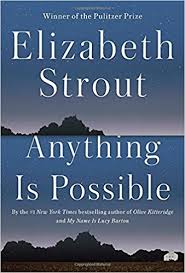Elizabeth Strout
Random House

|
When Dottie saw couples like Mr. and Mrs. Small, she was sometimes comforted that her painful divorce years earlier had at least prevented her from becoming a Mrs. Small—in other words, a nervous, slightly whiny woman whose husband ignored her and so naturally made her more anxious. This you saw all the time. And when Dottie saw it, she was reminded that almost always—oddly, she thought it was odd—she seemed a stronger person without her husband, even though she missed him every day. from Anything Is Possible |
A place where everyone knows your name,
and everything else about you.
One gets the impression that Elizabeth Strout escaped to the big city, yet can’t totally free herself from the small Maine community in which she grew up, that kind of town where everyone knows your name—as well as your salary and current financial situation, your medical history, your family history with its embarrassing cousins, your marital relationship, extra-marital relationships, and where ninety percent of your high school graduating class still lives, married more or less unhappily to each other. A happy place, this is not.
Of course, there are also strengths and virtues to small-town life, such as…well, Strout doesn’t really provide us many examples. Her stories are about the private little sorrows, unspoken and unforgotten, that people carry around with them each day: the tragedies of unlived lives and loveless marriages, of disappointments and guilts and regrets, and the dusty dreams that once gleamed, pointing to bright and happy futures.
Such sorrows may be common to the human condition in twenty-first century America, but for Strout, small town life seems to magnify them. Previously, in her Pulitzer prize-winning novel, Olive Kitteridge (2009), her stories had a melancholy tone, yet were balanced with a wry, understated humor. Her books since have kept the melancholy, though I think not the humor.
In her recent collection of inter-linked short stories, Anything is Possible, we meet a number of characters who appeared in her 2016 novel My Name is Lucy Barton, including Lucy, now living in New York City as a successful writer, who returns to the “run-down town” of Amgash, Illinois, for a visit.
There we meet Tommy Guptil, retired school janitor, who sees scarred and hollowed adults on the streets and remembers them as the poor kids, the neglected and abused kids to whom he would quietly slip quarters to buy food.
Most of the characters are broken and embittered, suggesting that small towns produce small souls. Secrets and shame are recurring motifs in the townspeople’s lives, like that of Abel Blaine, a rich man who grew up so poor as a child that he was reduced to eating out of dumpsters. He now doesn’t know which he is more ashamed of, his childhood poverty or his current wealth.
This is far from Norman Rockwell’s sentimental visions of a hard-working, basically decent, quietly proud America. In Strout’s telling, the American heartland is a place of broken hearts and broken dreams, those painful artifacts people keep locked away in the private rooms of their souls they never show to others.
This review first appeared in The Columbia River Reader (June 15-July 14, 2017.) Reprinted with permission.



